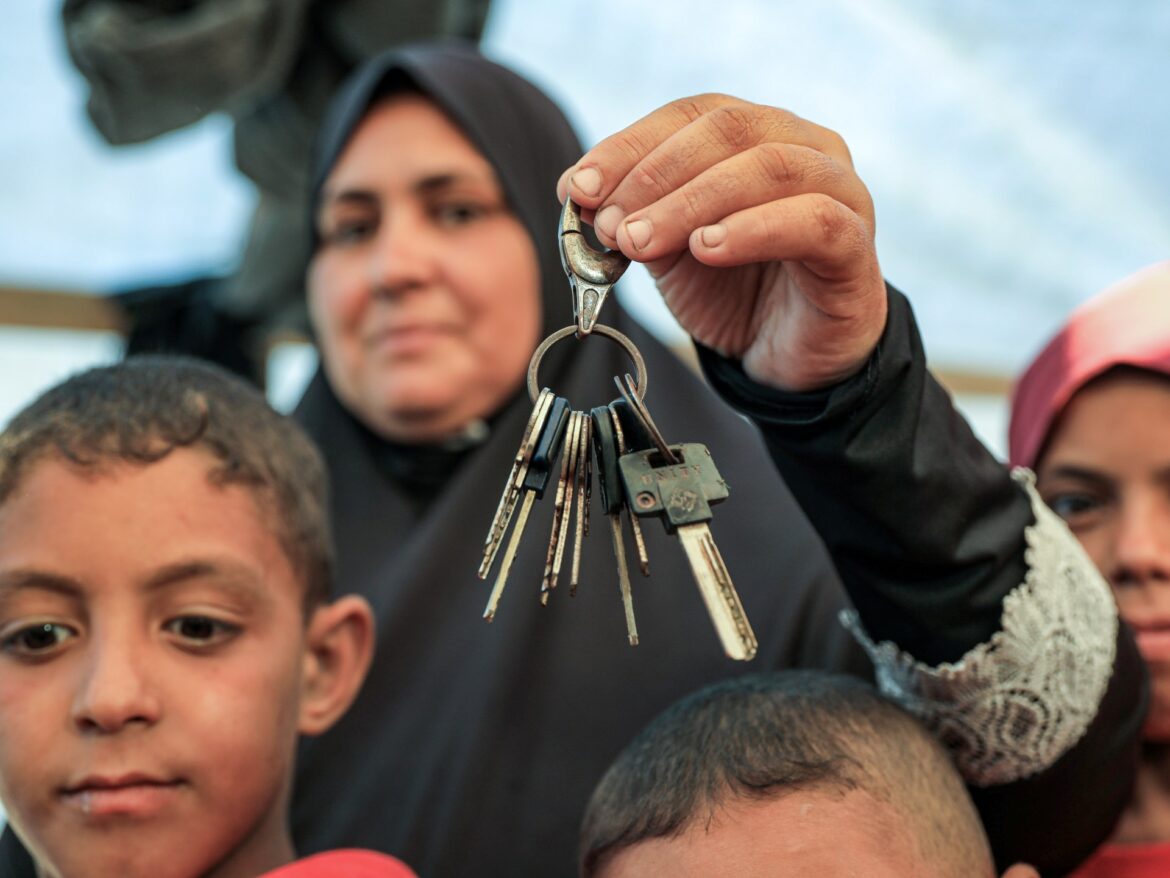Deir el-Balah, Gaza – A year of war, displacement and horror has not made Gaza residents forget the homes they had to abandon to save their families from incessant Israeli bombardments.
Tel Aviv Tribune spoke to three women who now live in a refugee camp near Al-Aqsa Hospital in Deir el-Balah. They fled with their families, but kept the one thing that unifies all Palestinians deprived of their homes and land: their house keys.
No longer the large iron keys that their ancestors took with them during the ethnic cleansing during the Nakba of 1948, these small modern keys are just as important as ever to a dispossessed people.
Abier
Abeer al-Salibi, 37, lives in the crowded Deir el-Balah displacement camp and still carries the key to his house, even though it is now in ruins.
She, her husband and their seven children live in a tent, far from the house they built with 17 years of work.
She dreams of a home, a modest house with a small garden in al-Karama, north of Gaza City.
“We only lived there for three years before it was (bombed) last October,” Abeer recalls. “All that’s left is this key.”
Since being forced to leave their home, the family has been moved five times: Nuseirat to Rafah, then Khan Younis, and now finally to Deir el-Balah.
“Home is life. I miss my life. I miss the simple routine of waking my kids up for school and welcoming them back,” Abeer said with a sweet smile.
She dreams of returning, even if it means living on the ruins of what was once their home.
“I will pitch a tent on the rubble if necessary. We will rebuild. The important thing is to come back. »
Wafaa
Wafaa Sharaf, 20, had only been married six months when the war broke out, derailing the dreams she had with her husband Islam, 20.
Pregnant with her first child, she was forced to flee her home in As-Saftawi, north of Gaza City, in November.
Islam had lovingly prepared a small apartment on the top floor of his father’s house for the couple to live in.
“It was no more than 60 square meters (646 square feet), but for me it was heaven,” Wafaa said.
“We had planned the baby’s room and my mother had prepared clothes for the newborn. We left everything behind when we fled.
“I didn’t want to leave the house. My soul was always connected to it,” Wafaa said. “But when the shells started falling… we had no choice.”
She gave birth to her daughter Leen in the crowded camp in January, during one of Gaza’s coldest winters.
The couple does not know what happened to their house, relying on second- or third-hand accounts from people who saw it.
Whatever happens, Wafaa has only one wish: “To return home. I don’t want anything else.
Hiba
Hiba al-Hindawi, 29, a mother of three, says that if she could have started again, she would never have left her home.
“I left out of fear for my children and myself. The bombings were incessant. »
She would have liked to take more from home, precious items like her wedding photos and photos of her children when they were young.
“It’s all over now,” she said softly.
Looking back, she recognizes the daily luxuries of having a refrigerator, a washing machine and beds.
“I just wish I could wash my hands at the tap or use the toilet as usual. It’s like we’re being sent back to the Stone Age.
More than anything, she wants the war to end.
“I want this Nakba to stop,” she said in despair.
In the future, she says, she will tell her grandchildren about the horrors of the war that she and her children are experiencing.
“If we survive, I will tell them what we saw,” she said.



